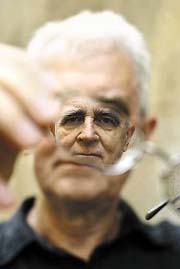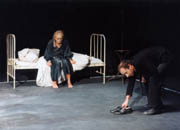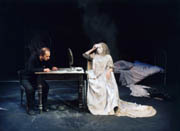
A Dialogue with the Polish Master Krystian Lupa
by Randy Gener
 |
| Krystian Lupa |
NEW YORK CITY and WROCLAW, POLAND -- In Europe, the Polish stage director Krystian Lupa is considered a theatrical giant. As attested by the 13th Europe Theatre Prize that was bestowed upon him this past April, Lupa is ranked alongside such major world figures as Harold Pinter, Peter Brook, Ariane Mnouchkine and Pina Bausch. A director, stage designer and writer, Lupa has been honored with an Austrian Cross of Merit in 2001 and the French Order of the Fine Arts and Humanities in 2002.
In Poland, Lupa is considered a patriarch. As head of the directing program of the Krakow State Drama School, he has trained generations of actors and directors, notably Grzegorz Jarzyna (TR Warszawa), Krzysztof Warlikowski (Krum at Brooklyn Academy of Music) and Piotr Cieplak, all of whom are Lupa disciples. So strong is Lupa’s influence that these latter directors actually create works that either run counter to his vision or consciously move in completely new directions. There is a strong argument to be made that Lupa, not the late Polish director Jerzy Grotowski, is the true shadow that looms behind today’s Polish directing scene, since for many younger directors Grotowski is a figure of myth and legend whose 1960s experimental work they have probably not witnessed firsthand.
In the United States, unfortunately, Lupa is a complete unknown. Unlike Grotowski, whose roots in the U.S. remain deep and profound and whose legacy is being remembered on both sides of the Atlantic with the Grotowski Year 2009 celebrations, Lupa has yet to find his audience.
 |
| Stary Teatr's production of "Kalkwerk." Photo by Marek Gardulski. |
That situation may change after Lupa’s signature production—the Krakow ensemble Narodowy Stary Teatr’s much-praised 1992 production of Thomas Bernhard’s Kalkwerk (The Lime Works)—makes its U.S. premiere from July 14 to 18, as part of the Lincoln Center Festival 2009. The key word to note in that previous sentence is “may.” It is possible that Lupa’s recognizability factor might increase as a result of this Lincoln Center outing. It is conceivable that his Central European aesthetic might penetrate the Western-leaning blockbuster mentality of America’s current international scene.
Among close observers and lovers of world theater, Lincoln Center Festival 2009 will be remembered not only for the great artistry displayed by Ariane Mnouchkine and her company Le Théâtre du Soleil’s Les Éphémères, but also for boldly sticking its neck out on such a risky proposition as Lupa. Thanks to the support of the Polish Cultural Institute, Kalkwerk. marks Lincoln Center Festival’s first foray into the Polish theater. But will this Polish production be another one-off at this summer festival, similar to, say, the great Romanian director Silviu Purcarete’s one-time-only-U.S.-appearance in the summer of 1997 (never to be seen since)?
Believe it or not, the answer to that question goes beyond the ability of our U.S. theater reviewers to fully come to grips with Lupa’s work. Although it would be a positive sign if Kalkwerk actually receives positive critical notices, the probable truth is that American audiences in general would have to learn how to embrace the challenges and complexities of this Polish master’s layered, interpretive creations.
Given their cultural specificity and their philosophical dimensions, those challenges can be considerable, since Lupa is nothing if not obsessed with exploring the problems and myths associated with human spiritual development.
 |
| Stary Teatr's "Kalwerk." Photo by Marek Gardulski |
Consider this: Kalkwerk. is a four-hour stage adaptation of Das Kalkwekbrings, a dense, difficult 1970 Austrian novel by Bernhard. It is a complex surrealist work about a homebound scientist in an abandoned lime works who compulsively invites his own ruin. Kalkwerk belongs to what can only be described as Lupa’s classical period. In the mid-1980s, Lupa put on plays based on available texts. He frequently adapted great Austrian, German and Russian literature works by Rainer Maria Rilke, Robert Musil and Fyodor Dostoyevsky for the small stage (Scena Kameralna) of the Stary Teatr in Krakow. In 1995–1998, Lupa produced an adaptation of Broch’s The Sleepwalkers. Recently, however, Lupa has turned his attention to pop-culture figures and self-mythologizing figures, frequently creating performances based on hundreds of hours of videotapes of actors doing improvisational experiments.
If that description already seems too unapproachable, Kalkwerk retains and pursues the imperceptible mutabilities of Lupa’s brand of immersive art-theatre. Fascinated by Witkacy and Jung’s writings on psychoanalysis, Lupa asks us to submit to slowness and subtlety—not stretched-out slowness á là Robert Wilson, but sluggish plotting, extended time and digressive unfolding. This quality of heightened focus could prove to be too much for our fast-paced, gratify-me-now, ADD culture.
In the Polish city of Wroclaw, where Lupa formally received the Europe Theatre Prize, I had the opportunity to see his current productions and works-in-progress. Factory 2 was an eight-hour dramatization of the oft-told story of American Pop icon Andy Warhol and his Factory acolytes, as fantasized by Lupa and his actors. Lupa was also present during an open-rehearsal presentation, clocking in at three hours, of the Marilyn Monroe section of a planned nine-hour triptych, Persona, that will also meditate on the figures of the mystic G.I. Gurdjieff and the philosopher Simone Weil.
Since Lupa and Grotowski belong to the same theatrical culture, there is a strong symbolic sense in both Wroclaw and in the Lincoln Center Festival that Lupa might be taking over the mantle that Grotowski left behind. Although the distinguished Polish theater critic and translator Malgorzata Semil insists that “Lupa is Lupa is Lupa is Lupa, with or without Grotowski (he has earned his position on his own),” there is an argument to be made that Lupa is indirectly indebted to Grotowski, whose anniversary-year celebration has made it possible for a great deal of contemporary Polish theater work to be exported abroad.
 |
| Krystian Lupa |
And yet Lupa does not consider himself a disciple of Grotowski. Like many contemporary Polish directors, Lupa consciously distances himself from the physical and vocal pyrotechnics developed by Grotowski and his disciplines—so much so that in an published interview, Lupa goes so far as to call Grotowski a fake and a sham. It was a charge that caused some consternation among several Polish actors who knew Grotowski and had worked with him closely.
As my interview with Lupa below shows (conducted with a Polish translator), Lupa is deeply aware that many gurus are emperors with no clothes—that often actors blindly follow a great artist by simple virtue of their charisma. In his most recent works, particularly Factory 2 and Persona, Lupa seeks to expose the irony of the phenomenon of personality, and he doesn’t mind besmirching the sacred idols to prove his point.
RANDY GENER: Mr. Lupa, in the past, you have shown a very strong and special interest in adapting the works of such Austrian writers as Rilke, Musil, Broch and Bernhard. What did you aim for Polish audiences to understand or learn by creating works based on Austrian literary works?
KRYSTIAN LUPA: Austrian writers of the first half of the 20th century, including Bernhard—he was an uncompromising and critical continuator of their tradition—mapped out a literary path for extreme penetration of phenomena within the human personality. They discovered personality not as a formula for the man’s character but as an unpredictable and mysterious process. An attempt to carry out this process through the theatre (in particular through the actor) was for me an opportunity to expand the potential of the theatrical language, and, at the same time, it was a testing ground for the theatre and the audience, for new topics of contemporary reality, in which the existing language and the way the man has been seen so far are no longer true.
GENER: Kalkwerk is a 1992 production that is only now premiering in the U.S. What do you hope American audiences today will understand or learn through seeing this production?
LUPA: First of all, I hope they will meet and appreciate Thomas Bernhard. I think the reason this author has not been very successful in American theaters yet is that this literature is treated too formally—in conventional terms of literary avant-garde. Let me quote Ingeborg Bachmann’s brilliantly insightful comment on Bernhard: “Thomas Bernhard is not a new literary style; it is a totally new genre in human thinking.” Not until the director and subsequently the viewer understand that, may they get infected by the author. And that is a kind of illumination.
GENER: Why is it that your Polish productions are only now being presented in the U.S.? With the exception of your directing a Chekhov play at the American Repertory Theater in Cambridge, Mass., have you ever tried to break into the U.S. theater market before?
LUPA: Well, perhaps a good idea would be to ask someody in the U.S.? As far as I am concerned, I have never tried to break into any market. I was always absorbed by the place (the esemble and the audience) where I was working at the moment.
GENER: In Wroclaw, I recently saw the Marilyn Monroe section
of your
three-part production of Persona. What other explorations do you wish to do?
How are the sections about Gurdjieff and Simone Weil connected to the Monroe
section?
LUPA: In Wroclaw, Marilyn was a work in progress. It was at the final phase of the actor’s process but still before the final editing of the staging and technical elements. In that part of the triptych, a view of personality as a reservoir of desires and potentials (rather than the actual condition and achievements of an individual) is combined with an object of self-mythologization and hypocrisies on the way to fulfillment. It is also a magic area of interpenetration by other personalities that cuts into and works secretly inside a self as role models. It also tackles transgression, the man’s eternal desire to step beyond his own personality, which he perceives to be a prison.
GENER: Based on what I observed and learned, you seem to be exploring new paths as a director, in which you are exploring the figure of celebrity artists like Warhol and Monroe, and the critics observe that these latest pieces of your are really self-portraits. Do you agree? Why or why not?
LUPA: Self-portraits? Mine or of the actors that identify with the characters they play? This [assessment] might be true in the sense that we follow the path (method) of identification. Working for a long time on the latest two productions, I and the actors lived a kind of parasitic life within the bodies and souls of our characters. This is an extreme experience. In the course of doing it, both sides changed: the artists and the characters subjected to that experiment. It is rather an attempt to take a personal trip inside another man to see what and how happens in there. This is a very intimate process that heads in a direction opposite to giving a character the actor’s own features.
GENER: In a published interview for a Warsaw publication, you called Grotowski “a fake.” What did you mean by this remark? In Wroclaw, there were other Polish actors present at the symposia who disagreed with you about Grotowski—how can you explain their disagreement? In what way was Grotowski “a fake”?
LUPA: This is another motif discussed in Persona (section about Gurdjieff). I was talking about what many spiritual masters do all too eagerly—believing in their unique road to initiation, too easily considering themselves spiritual masters in relation to their partners in the creative process. Jung calls it an unlawful (usurper) use of the power of a “great magician.” I treat my opinion of Grotowski as something very personal and subjective, no wonder some may disagree.
GENER: Would it be fair to describe your directing as “hyper realistic” and “immersive”? Why do your productions seem to be wedded to reality and text, while many other Polish directors seem to prefer abstraction and/or highly physicalized language?
LUPA: I can only suggest that I treat my performances as autonomous realities. They seek to live and not to imitate life. In order to live they need to have life mechanisms installed in them. But this is not an issue of the significance of the text. Human monologue (especially internal monologue) and dialogue are invaluable access paths to the man, who is ritually incarnated in the theatre. But they are not the only ones...
GENER: Now that you have won the Europe Theatre Prize as a major theater artist, what do you hope to create or explore artistically in the next five years?
LUPA: I would not like this prize (or any other one) to have any effect on how new subjects come up or evolve. By the way, this is a mystery even for myself. To a large extend, it happens by itself; my role is only that of a medium or carefully alert intuition. More motifs emerge as I walk my road, and the experience of the road owns them. They surface or are found, or they appear as still unattained. And they form an area of less and less free choice.
"Kalkwerk"
July 14-18 at 7:00 pm
Lincoln Center Festival
Gerald W. Lynch Theater at John Jay College
899 10th Avenue (btw. 58th & 59th Streets),
Tickets: from $35
Festival Box Office: Avery Fisher Hall (Broadway at 65th Street) 212.721.6500
Randy Gener, the senior editor of American Theatre magazine and founding critic of the New York Theater Wire, is the 2009 winner of the George Jean Nathan Award, the highest accolade for dramatic criticism in the U.S.

| home | reviews |cue-to-cue |
discounts | welcome |
| museums | recordings |coupons |
classified |